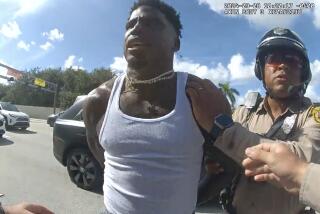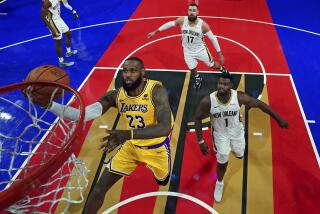4 Shot in Miami in 2nd Day of Racial Violence
MIAMI — Four people were shot Tuesday, as a second day of civil unrest shook a tense and weary Miami.
The city that had expected to show a pretty, sporting face during Super Bowl week instead found itself displaying the ugly lines of its racial tension.
Even as community leaders tried to keep people calm, dozens of incidents occurred in the city’s predominantly black Overtown and Liberty City areas.
The first shooting took place when a crowd heaved rocks at the white driver of a luxury car. As he sped away, the driver leaned from the window and fired a shot into the crush.
“All I know was that one person was hit in the side,” police spokesman Angelo Bitsis said of a wounded black, 19-year-old Derrick Mitchell, hospitalized in fair condition.
Suspected Sniper Wounded
At dusk, a police officer wounded a suspected sniper in the leg. Later a bystander was hit by what police said was sniper fire in Liberty City. At around 8:30 p.m. an alleged looter was shot by police.
Earlier in the day, police lobbed tear gas into a crowd of about 70 youths gathered around a car they had set ablaze. The crowd struck back, hurling anything they could find.
“I pay taxes for police protection !” one angry man shouted at the officers. “And all I end up doing is paying killers who kill people!”
A TV news van also was attacked. Its crew cowered as the glass around them burst.
The trouble began Monday evening after a Miami policeman, William Lozano, shot at two men on a motorcycle, killing the driver, Clement Lloyd, 23.
Immediately, angry crowds began accusing the police of murdering Lloyd, a black well-known in the neighborhood.
Questions about why the shooting occurred--and how police handled the following disturbance--have since vexed the city and fueled the rage.
Prominent ministers are among the incensed. “If the police department is really for all of us, it has to admit that someone simply made a mistake,” said the Rev. Irvin Elligan.
Tuesday, the U.S. Justice Department announced it had opened a civil rights investigation into the incident.
“The FBI is on the scene, and with them there, we are confident there will be a thorough and complete investigation,” said department spokesman Mark Weaver in Washington.
Miami Mayor Xavier Suarez similarly promised a complete and impartial probe. “Everything will go completely as it should, and that is the vow I make to anyone who’ll listen,” he said.
At the time of the shooting, Lozano was on foot, taking a report from a crime victim. He saw the motorcycle speed near, with a squad car in pursuit.
Lozano, who is white, is a 4-year veteran of the police force with several commendations.
Police have made no statement about whether the department believes the force justified. “I have not talked to Officer Lozano, and he has not given statement,” said Assistant Police Chief Don March.
Lloyd was part owner of a car wash. He had no record other than a 1986 arrest for marijuana possession.
The bullet struck him in the back of the head, then his motorcycle slammed into an oncoming Buick. It was the gunshot that was fatal, an autopsy showed.
Lloyd’s passenger, Allan Blanchard, later died from massive head injuries sustained in the crash.
As both men were removed in ambulances Monday, Suarez walked through Overtown, trying to speak with Lloyd’s mother and calm things down.
He was chased off amid the first barrage of rocks and bottles. Police in riot gear then moved into the streets.
That action--the appearance of so many policemen in full battle garb--infuriated the already angry crowd, many black civic leaders say.
“The riot gear alone is enough to incite the people,” said Annie Adker, a longtime Overtown activist.
Intermittent Sniper Fire
Afterward, there were six hours of intermittent sniper fire, rock throwing and looting. Three cars, including two owned by local TV stations, were set ablaze.
An auto parts store and a junkyard also burned. Firefighters were unable to approach the flames because of gunshots.
Seven people were injured in the disturbance; and seven were arrested, March said. Of the seven hurt, three were policemen and four were reporters. All the injuries were minor.
The civil disturbance breaks years of respite from such unrest. Miami had a serious riot in 1980, when 18 were killed. There were also disturbances in 1982 and 1984.
The relative harmony belied the grim fact that not much has changed for black Miami, where income is about half that of whites and the jobless rate exceeds the overall average by 50%.
Johnnie R. McMillian, president of the local chapter of the NAACP, said Tuesday that blacks are upset with the changing demographics of the community, where they feel they continually lose out in the job market to Latino immigrants.
“The African-Americans have felt cheated,” she said. “We felt we were losing our place in the city.”
Blacks are also upset with the treatment of Haitian refugees--who are often stopped at sea or, if they succeed in getting ashore, placed in detention camps. Other alien groups have fared better.
Thousands of Nicaraguans--most of them penniless--recently have arrived in Miami. The city has turned its baseball stadium into a temporary shelter for them, and there has been an outpouring of private donations.
“They interdict the Haitians at sea . . . and they meanwhile offer the red-carpet treatment to Nicaraguans,” said the Rev. Gerard Jean-Juste, an activist priest in the Haitian community.
The Overtown neighborhood itself has declined in recent years. It was once a proud, vibrant community, the center of night life for black Miami.
Then in the 1940s, thousands of people were removed for a proposed urban renewal program. But the main construction was not houses, but an expressway that cut the neighborhood in two.
To this day, plans to erect new buildings usually have nothing to do with residents and much to do with powerful business interests.
At the edge of Overtown is a brand new structure that city boosters view with boundless pride--a basketball arena, home to the NBA’s Miami Heat.
Hours before Tuesday’s scheduled tip-off against the Phoenix Suns, the city canceled the game. The danger was too great.
Related coverage in Sports.
More to Read
Sign up for Essential California
The most important California stories and recommendations in your inbox every morning.
You may occasionally receive promotional content from the Los Angeles Times.










